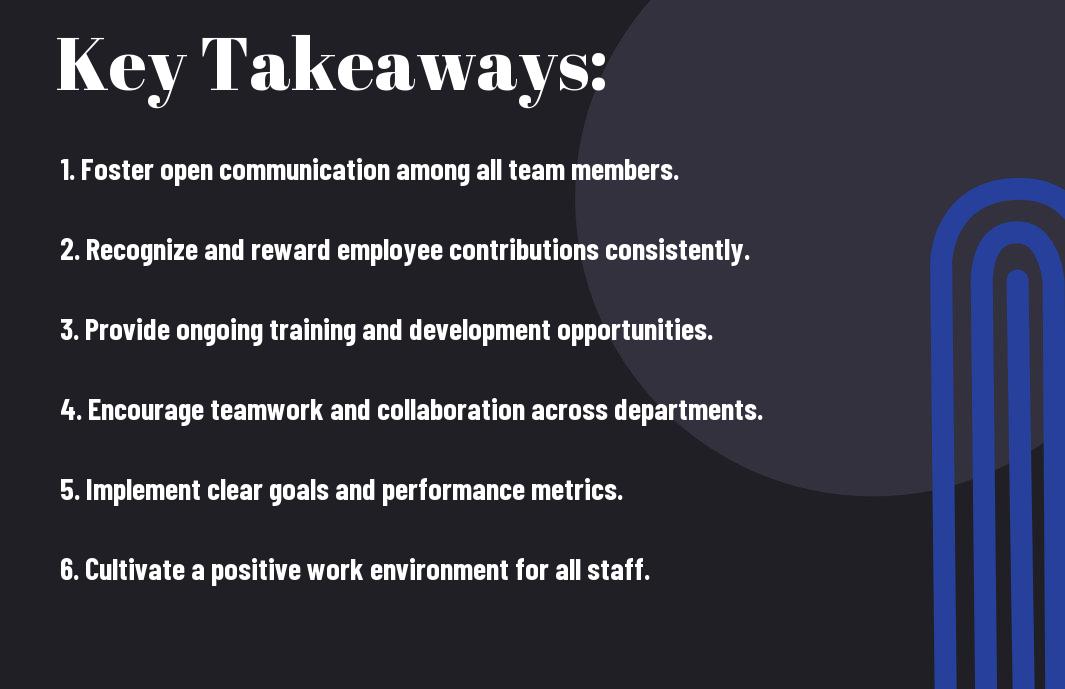Creating A High-Performance Culture – Strategies For Empowering Employees In Dental Care
You can transform your dental practice by cultivating a high-performance culture that empowers your employees. In this blog post, I will share effective strategies that can enhance employee engagement and boost overall productivity. You’ll discover how fostering collaborative teamwork, providing continuous education, and establishing clear goals can lead to a more motivated workforce. By implementing these practices, you not only improve patient care but also create an environment where your team thrives. Let’s look into the actionable steps you can take to revolutionize your dental care practice.
Key Takeaways:
- Foster open communication by encouraging feedback and discussions among team members to build trust and promote collaboration.
- Empower staff through professional development opportunities, providing training that enhances skills and encourages personal growth.
- Implement recognition programs that celebrate achievements, motivating employees and boosting morale within the dental practice.
- Align individual goals with the overall vision of the dental practice, ensuring that employees understand how their contributions impact patient care and team success.
- Promote a positive work environment that prioritizes well-being, work-life balance, and employee engagement to sustain high performance levels.

Understanding High-Performance Culture
While many organizations strive for efficiency, a high-performance culture sets itself apart by fostering an environment where employees feel motivated and empowered. In dental care, this culture promotes collaboration, innovation, and outstanding patient service, ultimately leading to improved outcomes for both staff and patients alike. By prioritizing a high-performance culture, you can create a workplace that attracts top talent and enhances your practice’s reputation.
Definition and Importance
An effective high-performance culture embodies shared values and objectives that drive operational excellence. This culture is important because it encourages employee engagement, resulting in higher productivity and job satisfaction. In your dental practice, cultivating such a culture can lead to improved patient care and a thriving team.
Key Characteristics
Around every high-performance culture lie several key characteristics, including clear communication, strong leadership, and a focus on continuous improvement. I’ve observed that organizations with a high-performance culture emphasize accountability, encourage collaboration, and provide recognition to their employees. These qualities foster an environment where everyone can excel and contribute positively to the practice.
To build a high-performance culture, it’s vital to cultivate trust among your team members, prioritize open communication, and set achievable goals. This culture is evident when staff demonstrate ownership over their tasks and engage in constructive feedback. Additionally, the celebration of team achievements plays a critical role in boosting morale. As I strive to empower my team, ensuring they feel valued and connected to the practice’s mission is vital for its success.
Strategies for Empowering Employees
If you want to cultivate a high-performance culture in your dental practice, consider implementing strategies that prioritize employee empowerment. This includes fostering an environment where team members feel valued and supported in their roles. By doing so, you can enhance motivation and productivity, leading to better patient care and overall practice success.
Communication and Transparency
An vital aspect of employee empowerment lies in establishing open lines of communication. When I ensure that my team is well-informed about practice goals, policies, and any changes, it builds trust and fosters a sense of belonging. Transparency encourages team members to voice their ideas and concerns, contributing positively to the practice culture.
Training and Professional Development
After implementing effective communication, it’s important to focus on training and professional development. Investing in your employees through continuous learning opportunities not only enhances their skills but also boosts their confidence and engagement in their roles.
Transparency in training and professional development allows you to identify the unique strengths and interests of your team members. By offering tailored programs, including workshops and mentorship, you can help them progress in their careers while aligning with your practice goals. This investment creates a dynamic and motivated team, leading to improved performance and increased patient satisfaction. Regularly assessing your team’s development needs fosters a culture of lifelong learning and demonstrates that you value their growth as part of your practice’s success.
Building a Supportive Work Environment
To create a supportive work environment in dental care, I focus on fostering collaboration and communication among team members. This promotes trust and respect, which are necessary in delivering exceptional patient care. Additionally, providing avenues for professional development enhances employee satisfaction. I encourage exploring resources like Building a Thriving Dental Team: Tips and strategies for effective ways to strengthen your practice’s culture.
Recognition and Reward Systems
After implementing recognition and reward systems, I’ve noticed a significant increase in employee motivation. Celebrating achievements and milestones fosters a sense of belonging and encourages continued excellence, enhancing the entire team’s performance.
Work-Life Balance Initiatives
With work-life balance initiatives, I prioritize the well-being of my team. By offering flexible scheduling options and encouraging time off, I help create an environment where employees can recharge and maintain their personal lives alongside their professional responsibilities.
Considering the impact of work-life balance on employee productivity and job satisfaction, I have found that offering initiatives like remote work options or flexible hours leads to a more engaged workforce. This balance can help avert burnout and significantly enhance employee morale. When your team feels supported in their personal lives, it not only boosts their performance but also contributes positively to the overall work culture. A healthy work-life balance is paramount for achieving long-term success in the dental practice.

Fostering Team Collaboration
Not only does fostering team collaboration enhance performance, but it also leads to a more cohesive work environment. I’ve found that when team members feel connected and supported, they are more willing to share ideas and contribute to each other’s success. Encouraging open lines of communication is vital, allowing for rapid problem-solving and innovative solutions. Ultimately, creating a collaborative culture ensures that everyone is working towards the same objective, improving patient care and job satisfaction.
Team-Building Activities
Behind every successful dental practice is a team that trusts and understands each other. Implementing regular team-building activities helps break down barriers and encourages collaboration among staff. I’ve seen immense benefits from structured activities, which not only strengthen relationships but also enhance communication and teamwork, leading to improved patient experiences.
Cross-Departmental Communication
An effective dental care environment thrives on seamless communication across all departments. Encouraging collaboration between administrative staff, dental hygienists, and dentists ensures that information flows smoothly, reducing errors and enhancing patient care. This interconnectedness allows for identifying and addressing issues promptly, creating a more efficient workplace.
But fostering strong cross-departmental communication requires intentional effort. When I prioritize open dialogues and create opportunities for regular updates between teams, it can dramatically impact operations. You may decide to hold weekly meetings or use collaborative software to streamline communication. It’s necessary to encourage a culture of feedback where everyone feels their input is valued. By breaking down silos, you empower your team to work collectively toward shared goals, ultimately enhancing the overall patient experience.
Measuring Success
After implementing strategies to empower your dental care employees, it’s vital to assess their effectiveness. Measuring success not only helps you understand what works but also guides adjustments that can improve performance. Establishing clear metrics enables you to celebrate achievements and address areas needing improvement, fostering a stronger high-performance culture.
Key Performance Indicators (KPIs)
To effectively gauge the performance of your dental practice, identifying relevant Key Performance Indicators (KPIs) is imperative. These metrics can include patient satisfaction scores, appointment completion rates, and employee turnover rates. By tracking KPIs, you gain valuable insights into the health of your practice and areas where enhancements can be made for continual growth and efficiency.
Employee Feedback and Surveys
KPIs alone do not provide a complete picture; gathering employee feedback through regular surveys is equally important. This direct input allows you to assess satisfaction levels and identify specific issues that may impact your team’s morale and productivity. Such feedback creates an open line of communication where employees feel heard and valued.
Performance feedback enables you to adjust policies and practices based on your team’s insights. Engaging employees through surveys can uncover positive trends and highlight dangerous gaps in morale or productivity. Ensuring anonymity in responses encourages honesty, allowing you to address vital concerns early on. Ultimately, fostering a culture where feedback is valued contributes to a motivated workforce and ensures your practice remains competitive and innovative.

Overcoming Challenges
Now, as you work towards creating a high-performance culture in your dental practice, it’s important to recognize and overcome challenges that may arise. Transformational change often encounters obstacles, from employee skepticism to institutional inertia. By addressing these hurdles effectively, you can foster an environment where every team member feels valued and motivated to perform at their best.
Addressing Resistance to Change
With every new initiative, you may face resistance from employees who are comfortable with the status quo. Engaging them early in the process fosters a sense of ownership and encourages open communication. By actively listening to their concerns and involving them in decision-making, you can transform resistance into collaboration, leading to an empowered workforce ready to embrace change.
Sustaining High-Performance Culture
Challenges to sustaining a high-performance culture can arise as time goes on. Hence, it’s vital to implement consistent feedback loops where employees feel safe to share their insights and suggestions. Regular training and development opportunities ensure that your team remains engaged, while clear and measurable goals help maintain focus. Recognizing and rewarding achievements, no matter how small, further cultivates a sense of belonging and motivation, ultimately leading to a thriving workplace where high performance is the norm.
To wrap up
Presently, creating a high-performance culture within dental care requires intentional strategies to empower you and your employees. By fostering open communication, recognizing achievements, and promoting continuous education, your practice can thrive. Engaging with your team and investing in their development not only enhances morale but also improves patient care. For more insights, I encourage you to explore How to build and maintain a positive dental workplace culture. Together, let’s cultivate a more dynamic and supportive work environment.
FAQ
Q: Why is creating a high-performance culture important in dental care?
A: A high-performance culture in dental care enhances the overall quality of patient care, boosts employee morale, and increases productivity. By fostering an environment where employees feel valued and empowered, dental practices can achieve better clinical outcomes and higher patient satisfaction. This ultimately leads to a stronger reputation and financial success for the practice.
Q: What strategies can be implemented to empower employees in a dental practice?
A: Empowering employees can be achieved through various strategies, including offering professional development opportunities, involving staff in decision-making processes, and recognizing their contributions. Creating a supportive environment that encourages continuous learning and open communication can also enhance employee engagement and satisfaction.
Q: How can leadership influence the development of a high-performance culture?
A: Leadership plays a significant role in shaping the culture of a dental practice. By modeling desired behaviors, setting clear expectations, and promoting a shared vision, leaders can inspire employees to perform at their best. Additionally, providing constructive feedback and fostering collaborative relationships can enhance trust and communication within the team.
Q: What role does communication play in empowering dental care employees?
A: Effective communication is vital for empowering employees, as it ensures clarity in roles and responsibilities, fosters collaboration, and encourages the sharing of ideas and concerns. Regular team meetings, open-door policies, and feedback mechanisms can help create a culture of transparency, making employees feel heard and valued.
Q: How can continuous learning contribute to a high-performance culture in dental care?
A: Continuous learning is vital for staying updated with best practices and advancements in dental care. Providing ongoing training, workshops, and access to educational resources not only enhances employees’ skills but also demonstrates the practice’s commitment to their professional growth. This investment fosters loyalty and motivation among staff, contributing to a high-performance culture.
Q: What are the benefits of recognizing employee contributions in a dental practice?
A: Recognizing employee contributions fosters a sense of appreciation and belonging, which can enhance job satisfaction and motivation. Implementing recognition programs, celebrating milestones, and providing positive feedback can help reinforce the value of each team member’s efforts, contributing to a more engaged workforce and ultimately improving patient care.
Q: How can a dental practice measure the effectiveness of its high-performance culture initiatives?
A: Measuring the effectiveness of high-performance culture initiatives can involve various approaches, such as employee satisfaction surveys, patient feedback, and performance metrics. Regularly evaluating these factors can provide insight into areas of success and opportunities for improvement, allowing the practice to adjust its strategies and maintain a positive workplace environment.






